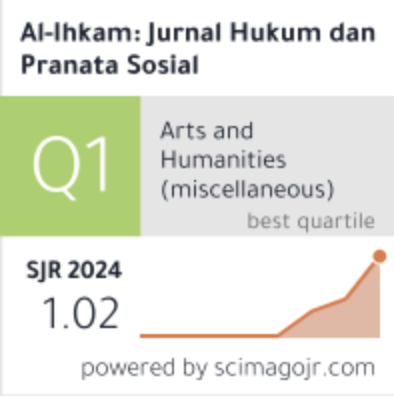PERKAWINAN ANAK DI BAWAH UMUR (Sebuah Kajian Perspektif Hukum Islâm Vis-a-Vis Hukum Positif di Indonesia)
 Abstract views: 559
,
Abstract views: 559
,
 PDF downloads: 795
PDF downloads: 795
Abstract
Abstrak:
Perkawinan merupakan suatu ikatan yang melahirkan keluarga sebagai salah satu unsur dalam kehidupan bermasyarakat dan bernegara, yang diatur oleh aturan hukum, baik hukum Islâm maupun hukum positif (negara). Untuk dapat mewujudkan tujuan perkawinan, hukum negara, yakni Undang-undang Nomor 1 Tahun 1974 menentukan batas umur minimal untuk melangsungkan perkawinan, yakni usia 19 tahun untuk pria dan usia 16 tahun bagi wanita. Sedangkan hukum Islâm tidak menentukan secara kongkrit batas minimal usia perkawinan. Meghadapi dualisme hukum ini, negara seharusnya mengambil langkah tegas. Jika negara sudah melarang perkawinan di bawah umur, maka konsekuensinya segala hukum yang bertentangan dengannya harus ditiadakan, sehingga terjadi kepastian hukum.
Abstract:
Marriage is the bond of family that becomes one of the elements of social and state life. It is regulated in both Islamic and state laws. To concretize the marriage purpose, state law apllies the constitution of Undang-undang Nomor 1 Tahun 1974 that decides minimal age limit of marriage---19 years old for male citizens and 16 years old for the female ones. On the other hand, the Islamic law do not explicitly declare this. State must take a firm action to face this dualism, it must forbid non-state regulation that is in contradiction against state law including the law that allows the marriage beyond the age limit. It is about to guarantee the legal security or rule of law.
Kata-kata Kunci:
Hukum Islâm, perkawinan di bawah umur, hukum negara, dan negara.
Downloads
In order to be accepted and published by Al-Ihkam: Jurnal Hukum dan Pranata Sosial, author(s) submitting the article manuscript should complete all the review stages. By submitting the manuscript, the author(s) agreed to the following terms:
- The copyright of received articles shall be assigned to Al-Ihkam: Jurnal Hukum dan Pranata Sosial as the publisher of the journal. The intended copyright includes the right to publish articles in various forms (including reprints). Al-Ihkam: Jurnal Hukum dan Pranata Sosial maintain the publishing rights to the published articles.
- Authors are permitted to disseminate published articles by sharing the link/DOI of the article at Al-Ihkam: Jurnal Hukum dan Pranata Sosial. Authors are allowed to use their articles for any legal purposes deemed necessary without written permission from Al-Ihkam: Jurnal Hukum dan Pranata Sosial with an acknowledgment of initial publication to this journal.
- Users/public use of this website will be licensed to CC-BY-SA.



.png)
_1.png)


_page-00011.jpg)


